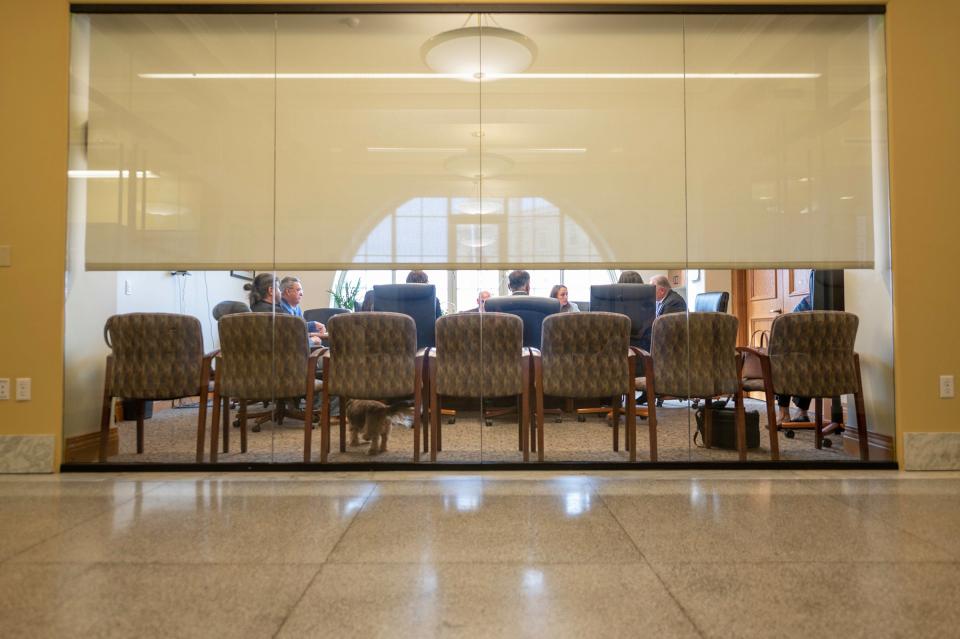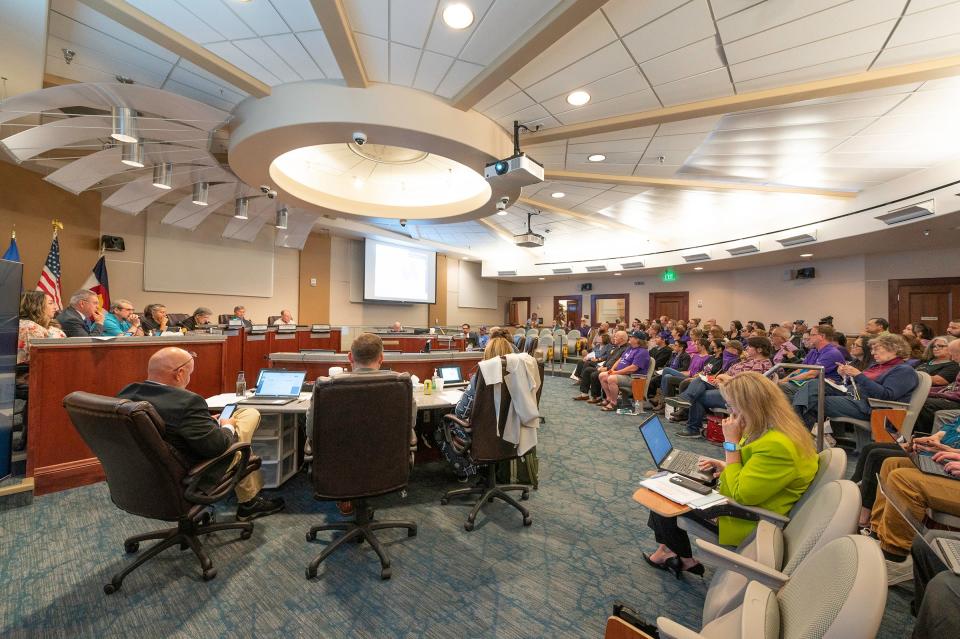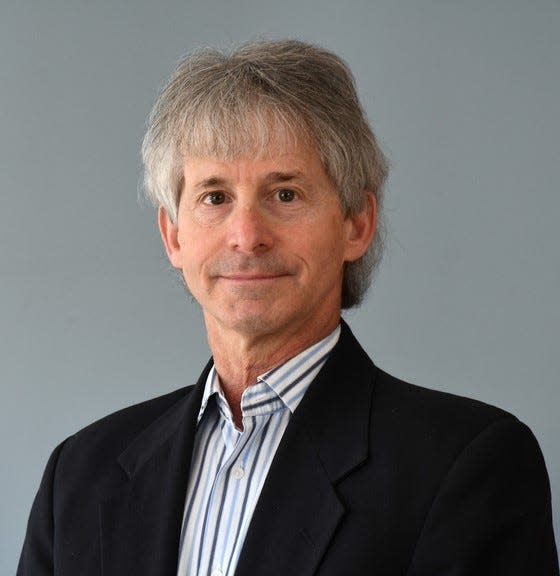Pueblo City Council violated open meetings law when discussing needle exchange, expert says
Pueblo City Council violated Colorado open meeting law on May 13 when it inadequately announced a closed-door discussion with the city’s lawyer. That’s according to Steve Zansberg, a Colorado attorney with expertise in the First Amendment and Colorado Sunshine Law.
Councilors filed into a private room shortly before 7 p.m. amid spirited discussions about banning syringe exchange programs in Pueblo. The growing crowd in council chambers waited over half an hour for the seven officials to re-emerge.
The work session agenda and Council President Mark Aliff’s announcement stated that council would seek legal advice on “specific legal questions” in an executive session but did not specify the topic.
That’s a “clear violation” of Colorado open meetings statute and case law, which require that local public bodies disclose what they’re going to talk about in executive sessions, Zansberg said. Because councilors didn’t adequately specify what they were going to talk about behind closed doors, any recordings or records from the meeting should be considered public documents.

What did city council talk about in the closed meeting?
Colorado law provides some carve-outs for public bodies to have limited discussions behind closed doors, but there are several parameters that have to be met, including specifying the topic in as much detail as possible.
City spokesperson Haley Sue Robinson initially declined to share the topic of the executive session a few days before the meeting. Robinson told the Chieftain in a May 10 text message that “the questions are attorney-client privilege so I’m unable to disclose them to you.”
But after the Chieftain requested an interview with the city attorney about the executive session Tuesday, Robinson disclosed in an email that council had talked about needle exchange programs behind closed doors. She said that City Attorney Carla Sikes could answer follow-up questions via email.
However, Robinson added that council’s discussion is “attorney-client privileged” and that Sikes “cannot discuss it with you.”
Another executive session that council went into on March 11 also appears to have violated Colorado open meetings law, as they were slated to receive “legal advice on specific legal questions” without specifying what those questions were.
Sikes disclosed in an email that council "receive(d) legal advice relating to the hiring of outside counsel" at the March 11 meeting, but did not specify why.
Sikes acknowledged in an email that the statutory language used to announce the executive sessions was "insufficient."
"We seek to be transparent as the City of Pueblo. No material was provided or reviewed during either executive session. There are no minutes to provide of either meeting," Sikes wrote, adding that the Chieftain could submit an open records request for the session recordings “and the city will respond as required.”
She did not address several of the Chieftain's emailed questions, including why the topic for the executive session was not initially disclosed to the public, why the city is now choosing to share the topic and who was responsible for the omission of the topic on the agenda.
City council's executive session discussions were not recorded
Another attorney in the city's legal department returned the Chieftain's open records request within hours of submitting it, but the recordings only capture snippets of council's discussion.
Most closed-door meetings are recorded, but the law provides an exception for recording "privileged attorney-client communication" when the government attorney recommends it.
"It is my opinion that part or all of the discussion of the matter announced in the motion to go into executive session constitutes a privileged attorney client communication, and therefore I am recommending that no record be kept of that part of the discussion which constitutes privileged attorney-client communication," Deputy City Attorney Harley Gifford stated on the partial recording provided from the May 13 closed-door meeting.
The official recording was turned off for 29 minutes for the discussion on needle exchanges with all seven councilors, Mayor Heather Graham, her Chief of Staff Brian McCain, Gifford and Sikes in the room.
A similar procedure was followed at the March 11 executive session: the official recording was also turned off during 22 minutes of discussion.
Council voted 5-2 to ban needle exchanges in Pueblo following hours of public testimony, mostly from people defending the programs.

‘This is an open and shut case’: How council violated the law
Public entities in Colorado are required by law to do most of their business in the open. However, there are narrow exceptions for city councils, county commissions, school boards and other groups of elected officials to discuss some topics in executive sessions — as long as several parameters are met.
Officials need to cite specific Colorado statute to justify closing their meeting to the public and include "identification of the particular matter to be discussed in as much detail as possible without compromising the purpose for which the executive session is authorized,” the law states.

Public bodies also need to vote affirmatively with at least two-thirds in favor to enter executive sessions and are not allowed to take any formal action or adopt any proposed policies.
“There's got to be some inkling given to the public — some topic about what they're going to be discussing behind closed doors so that the public has some idea of why they need to shut the door on them,” said Jeff Roberts, the executive director of the Colorado Freedom of Information Coalition, speaking generally about open records law.
“What they're going to be talking about, they don't have to go into much detail about that. But they have to say more than just, ‘We're going into executive session to get legal advice,’” Roberts said.
The Colorado Court of Appeals ruled in 2020 that the town of Basalt violated the state's open meetings law when they failed to disclose topics discussed in secret in the Guy vs. Whitsitt case.
Zansberg has successfully litigated many sunshine lawsuits, including as a member of the plaintiff’s legal team in Guy vs. Whitsitt. He is also the president of the Colorado Freedom of Information Coalition.
After reviewing the agenda and recording for Pueblo City Council’s meeting on May 13, Zansberg told the Chieftain that the announcement for the executive session in Pueblo mirrors what happened in Basalt — which “the Court of Appeals held was inadequate as a matter of law.”
“This is an open-and-shut case,” Zansberg said.
What attorney-client privilege means
The city has cited “attorney-client privilege” multiple times in communications with the Chieftain as the reason for keeping details about council’s May 13 executive session under wraps.
Attorney-client privilege is usually “sacrosanct” — on par with the confidential relationships between doctors and patients, Zansberg said. But disclosing the “general subject matter” of the communications does not violate attorney-client privilege.
“There's some rare exceptions, but by and large, the privilege attaches only to actual communications themselves: what is exchanged, what questions are asked of the attorneys (and) what answers are given by the attorneys,” Zansberg said.
Since the announcement was “inadequate as a matter of law,” any records of the meeting should be open to the public.
“If there's any record of that ‘executive session’ — or, closed meeting, because it's not an executive session — it's a public record,” Zansberg said.
All executive sessions should be recorded, except there is a carve-out in the law for “privileged attorney-client communications,” according to the CFOIC sunshine law guide.
Colorado’s open government laws have been around since a successful 1972 citizen initiative, per an article that Roberts wrote on the CFOIC website last year. The Colorado Legislature strengthened the law in 2001 by requiring state and local public bodies to announce topics of executive sessions in as much detail as possible — which the state court of appeals upheld in 2020 in the case involving the Basalt town council.
Council has held at least six other executive sessions in recent months
Under Sikes’ leadership as city attorney, which started in an interim role on the first day of Graham’s term and was made official in March, council has gone into at least six executive sessions.
City council most recently entered executive session at its May 20 work session and disclosed the topics in the agenda and an announcement prior to the closed-door meeting. Councilors discussed a pending real estate transaction, as well as legal advice on a replacement for Councilor Charles “Chuck” Hernandez, who resigned from council Saturday to spend more time with family.
Three other recent executive sessions on Feb. 26, March 4 and April 1 pertained to real estate.
Sikes is the fourth person to lead the city’s legal office since April 2023.
Anna Lynn Winfrey covers politics for the Pueblo Chieftain. She can be reached at awinfrey@gannett.com. Please support local news at subscribe.chieftain.com.
This article originally appeared on The Pueblo Chieftain: Expert says Pueblo City Council violated Colorado open meetings law

